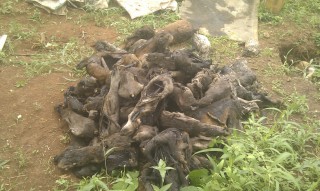Congo Gets Tough on Wildlife Traffickers

PALF Confiscated bushmeat from Congo.
The Wildlife Conservation Society reports a major seizure of illegal bushmeat in Congo at Maya Maya International Airport in Brazzaville when authorities recently confiscated approximately 40 animals including monkeys, antelope, and porcupine.
In an unrelated incident, two bushmeat traffickers were arrested transporting 30 carcasses of similar wildlife through the Mila Mila area of Niari. The traffickers are currently awaiting trial.
The seizure and arrests were assisted by PALF (Project for the Application of Law for Fauna – Republic of Congo), a pioneering partnership of the Wildlife Conservation Society and the Aspinall Foundation and supported by the USFWS that is committed to ending wildlife trafficking in Congo.
Conservationists report that recent infrastructure improvements such as better roads and transportation hubs in Congo have resulted in an uptick in illegal hunting and trafficking of protected species. In addition, traffickers are resorting to threatening wildlife authorities and PALF members in an effort to scare local authorities.
“PALF’s work to stop illegal wildlife trafficking by improving Congo’s legal system is more important than ever,” said James Deutsch, WCS Executive Director for Africa Programs. “Illegal wildlife trafficking has the potential to strip mine Congo of its world class wildlife and natural heritage. Only through tough law enforcement and stopping corruption can trafficking be eliminated.”
To aid in future enforcement efforts, PALF launched a sniffer dog program last month that works with local authorities to detect illegal wildlife products including ivory being transported within the country and internationally.
Wildlife Conservation Society (WCS)
MISSION: WCS saves wildlife and wild places worldwide through science, conservation action, education, and inspiring people to value nature. VISION: WCS envisions a world where wildlife thrives in healthy lands and seas, valued by societies that embrace and benefit from the diversity and integrity of life on earth. To achieve our mission, WCS, based at the Bronx Zoo, harnesses the power of its Global Conservation Program in more than 60 nations and in all the world’s oceans and its five wildlife parks in New York City, visited by 4 million people annually. WCS combines its expertise in the field, zoos, and aquarium to achieve its conservation mission. Visit: www.wcs.org; http://www.facebook.com/TheWCS; http://www.youtube.com/user/WCSMedia Follow: @thewcs.
Media Contact
More Information:
http://www.wcs.orgAll latest news from the category: Ecology, The Environment and Conservation
This complex theme deals primarily with interactions between organisms and the environmental factors that impact them, but to a greater extent between individual inanimate environmental factors.
innovations-report offers informative reports and articles on topics such as climate protection, landscape conservation, ecological systems, wildlife and nature parks and ecosystem efficiency and balance.
Newest articles

Bringing bio-inspired robots to life
Nebraska researcher Eric Markvicka gets NSF CAREER Award to pursue manufacture of novel materials for soft robotics and stretchable electronics. Engineers are increasingly eager to develop robots that mimic the…

Bella moths use poison to attract mates
Scientists are closer to finding out how. Pyrrolizidine alkaloids are as bitter and toxic as they are hard to pronounce. They’re produced by several different types of plants and are…

AI tool creates ‘synthetic’ images of cells
…for enhanced microscopy analysis. Observing individual cells through microscopes can reveal a range of important cell biological phenomena that frequently play a role in human diseases, but the process of…





















